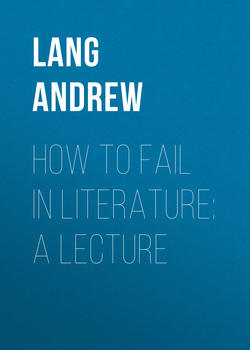How to Fail in Literature: A Lecture

Реклама. ООО «ЛитРес», ИНН: 7719571260.
Оглавление
Lang Andrew. How to Fail in Literature: A Lecture
PREFACE
HOW TO FAIL IN LITERATURE
Отрывок из книги
What should be a man’s or a woman’s reason for taking literature as a vocation, what sort of success ought they to desire, what sort of ambition should possess them? These are natural questions, now that so many readers exist in the world, all asking for something new, now that so many writers are making their pens “in running to devour the way” over so many acres of foolscap. The legitimate reasons for enlisting (too often without receiving the shilling) in this army of writers are not far to seek. A man may be convinced that he has useful, or beautiful, or entertaining ideas within him, he may hold that he can express them in fresh and charming language. He may, in short, have a “vocation,” or feel conscious of a vocation, which is not exactly the same thing. There are “many thyrsus bearers, few mystics,” many are called, few chosen. Still, to be sensible of a vocation is something, nay, is much, for most of us drift without any particular aim or predominant purpose. Nobody can justly censure people whose chief interest is in letters, whose chief pleasure is in study or composition, who rejoice in a fine sentence as others do in a well modelled limb, or a delicately touched landscape, nobody can censure them for trying their fortunes in literature. Most of them will fail, for, as the bookseller’s young man told an author once, they have the poetic temperament, without the poetic power. Still among these whom Pendennis has tempted, in boyhood, to run away from school to literature as Marryat has tempted others to run away to sea, there must be some who will succeed. But an early and intense ambition is not everything, any more than a capacity for taking pains is everything in literature or in any art.
Some have the gift, the natural incommunicable power, without the ambition, others have the ambition but no other gift from any Muse. This class is the more numerous, but the smallest class of all has both the power and the will to excel in letters. The desire to write, the love of letters may shew itself in childhood, in boyhood, or youth, and mean nothing at all, a mere harvest of barren blossom without fragrance or fruit. Or, again, the concern about letters may come suddenly, when a youth that cared for none of those things is waning, it may come when a man suddenly finds that he has something which he really must tell. Then he probably fumbles about for a style, and his first fresh impulses are more or less marred by his inexperience of an art which beguiles and fascinates others even in their school-days.
.....
Editors and publishers, these keepers of the gates of success, are not infallible, but their opinion of a beginner’s work is far more correct than his own can ever be. They should not depress him quite, but if they are long unanimous in holding him cheap, he is warned, and had better withdraw from the struggle. He is either incompetent, or he has the makings of a Browning. He is a genius born too soon. He may readily calculate the chances in favour of either alternative.
So much by way of not damping all neophytes equally: so much we may say about success before talking of the easy ways that lead to failure. And by success here is meant no glorious triumph; the laurels are not in our thoughts, nor the enormous opulence (about a fourth of a fortunate barrister’s gains) which falls in the lap of a Dickens or a Trollope. Faint and fleeting praise, a crown with as many prickles as roses, a modest hardly-gained competence, a good deal of envy, a great deal of gossip – these are the rewards of genius which constitute a modern literary success. Not to reach the moderate competence in literature is, for a professional man of letters of all work, something like failure. But in poetry to-day a man may succeed, as far as his art goes, and yet may be unread, and may publish at his own expense, or not publish at all. He pleases himself, and a very tiny audience: I do not call that failure. I regard failure as the goal of ignorance, incompetence, lack of common sense, conceited dulness, and certain practical blunders now to be explained and defined.
.....